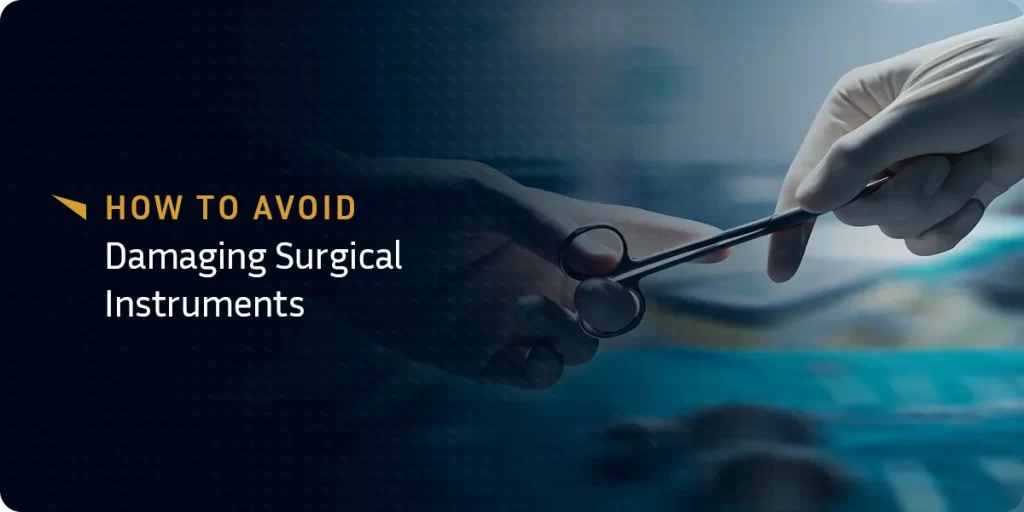
Surgical instruments play critical roles in the quality of care for your patients. Performing the proper care and maintenance is essential for ensuring long instrument service life, reliability in the operating room and disease prevention among patients.
Although the industry recognizes stainless steel as one of the most durable and longest-lasting materials for surgical instruments, remembering that it is not entirely corrosion-resistant is vital. Most surgical tools are often only as good as the care provided to them.
Explore critical maintenance techniques for preventing corrosion damage, spotting or staining on your instruments to ensure the longest life spans.
Proper Transportation
Choosing the most practical and effective cases or trays to transport your surgical instruments before and after use is paramount. Besides ensuring the sterilization of your surgical tools, heavy-duty and highly durable containers are critical for preventing equipment damage. Virtually every reusable surgical instrument requires a case for safe transportation, from scissors and clamps to catheters and endoscopes.
High-performance cases — like the surgical sterilization containers offered by Jewel Precision — protect your instruments and keep them safe from accidental drops and other causes of damage. Our products provide a reliable, efficient solution for instrument transportation, handling and storage and deliver superior protection during autoclave sterilization. Cases from Jewel Precision feature premium-grade materials and surface finishes designed for superior strength and durability.
Customized cases specifically built to the exact specifications of each application offer the highest levels of instrument protection.
Cleaning and Disinfecting
Cleaning and disinfecting your surgical instruments according to the manufacturer’s instructions is essential for preventing damage and keeping your tools in good condition. Residual contaminants left on a device can damage its surface and affect its ability to function accurately and safely. Various instruments require different types of cleaning, with some requiring multiple cleaning or disinfection stages.
- Manual cleaning: Immediately after the surgical procedure, a technician must wash the device to remove dirt and debris from the surface. This process also includes a visible inspection to ensure all device components function. Technicians typically use plastic brushes for most instruments, immersing the device in demineralized or distilled water with the recommended cleaner.
- Disinfecting and sterilization: After the manual cleaning, most surgical devices undergo automatic high-level disinfection (HLD) or sterilization. Disinfection equipment uses solutions with specific pressures, temperatures and time cycles to ensure thorough cleaning. Autoclave sterilization delivers high-pressure steam at gradually increasing temperatures to kill any bacteria or other microorganisms that could ultimately affect functionality or spread illnesses.
- Drying: Appropriate drying before storage is critical since bacteria can form on a wet surface quickly. After drying, technicians should only handle the instruments with gloved hands.
Refurbishing Worn Instruments
Even instruments that undergo the proper cleaning, handling and storage sometimes need repair or refurbishing. The more you use a surgical device, the more maintenance it may require, including sharpening or tension adjustments. General guidelines recommend that devices used daily undergo refurbishing at least once annually. Regular visual inspections can help you determine when less frequently used tools need servicing.
Improperly functioning instruments should never reach the operating table. The best maintenance practices involve refurbishing instruments at the first signs of malfunction instead of waiting for the tool to stop working entirely. Technicians must also remember that timely repairs and maintenance are critical for meeting the device’s warranty requirements.
More importantly, following the manufacturer’s maintenance instructions is vital for patient safety.
Instrument Lubrication
Lubrication is another crucial step in surgical instrument care because it helps prevent corrosion, minimize wear and tear and decrease friction. Proper lubrication reduces the risk of failure, ensures smooth and accurate movement and extends a device’s life span. Lubricants also act as protective barriers, shielding surfaces from harsh chemicals, moisture and other potentially harmful contaminants.
Some devices benefit from small amounts of lubrication after each use. Choosing the proper lubricant specified by your instrument’s manufacturer is essential, as some materials require specific products to work effectively.
Understanding Which Chemicals Can Corrode and Destroy Surgical Instruments
Stainless steel’s durability and corrosion resistance often depends on the instrument’s passive layer, which is typically a protective layer of chromium or iron oxide. While these passive layers are highly resistant to corrosion, salt solutions, chlorides and other harsh chemicals can still damage them. Technicians must also remember that rinsing with distilled water ensures proper cleaning, as the high concentration of minerals in tap water can cause spotting or staining on instruments.
Specific types of chemicals that can potentially damage surgical instruments include:
- Alkaline-based cleaning solutions
- Dish soap or laundry soap
- Hydrogen peroxide
- Ammonia
- Bleach
- Iodine products
- Hydrochloric acid
Discover More With Jewel Precision
If you want to learn more about protecting your surgical instruments and extending their life spans, the experts at Jewel Precision can help. Since 1984, we’ve developed and manufactured the industry’s top case solutions to help medical applications optimize storage and sterilization processes. Our products set the industry standard for superior quality, performance and innovation.
Contact us online or call 973-857-5545 today to request a price quote or additional product information.